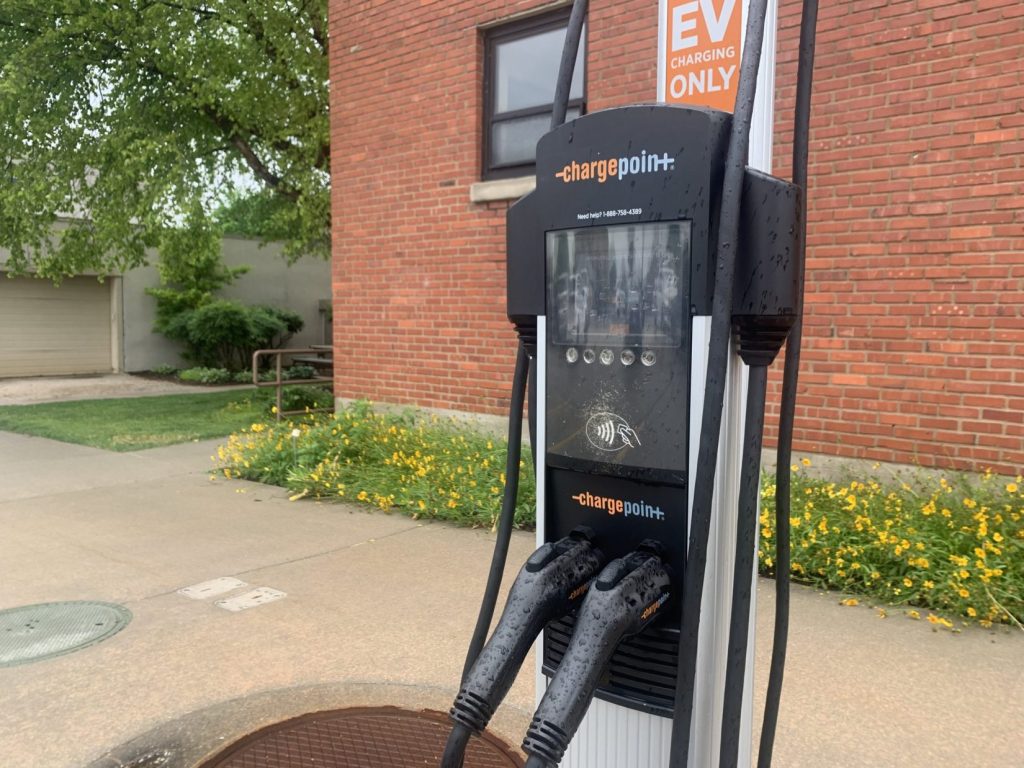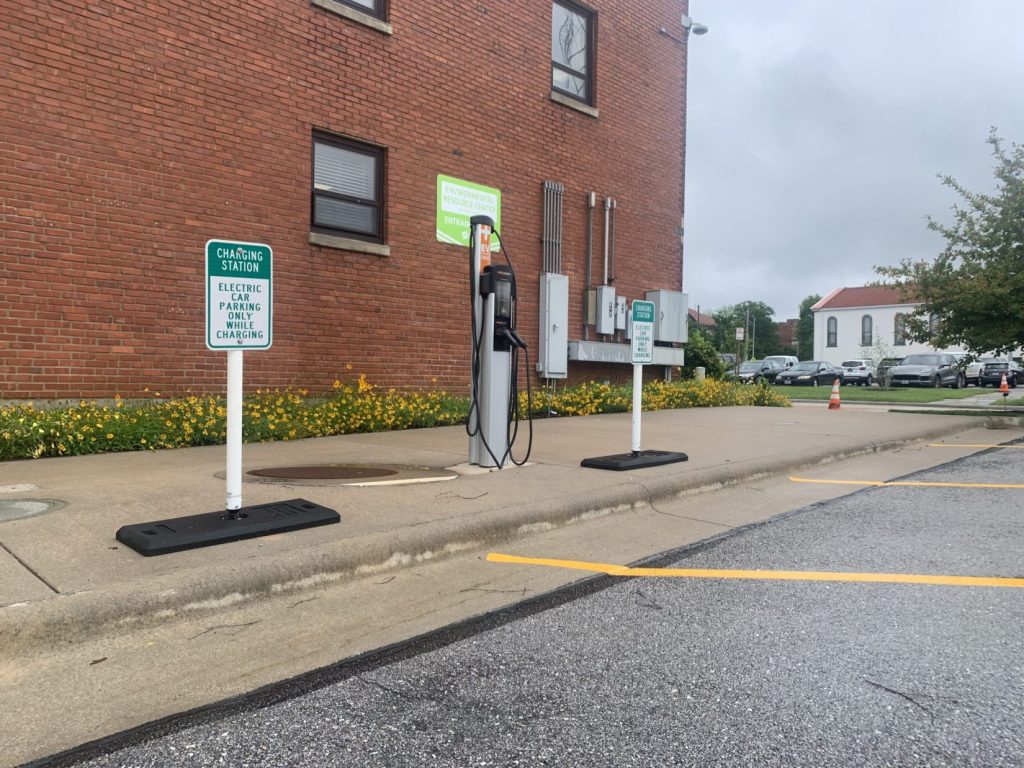If you’re thinking about buying an electric vehicle, there is something to consider that could lower the cost of setting up a charging station in your garage.
While there are many costs to consider with any vehicle purchase, Springfield City Utilities has some rebate programs for people who want to buy an electric car and charge it at home. Brent Baker, an electric vehicle driver and CU's associate general manager of customer operations and communications, discussed rebate programs with the Springfield Utilities Board.
“Electric vehicles are really starting to be a part of society, and it's going to be more and more,” Baker said.
In 2021, Springfield City Utilities started a rebate program for electric vehicle chargers added to new houses. A home buyer can get a rebate of up to $100 per outlet when contractors and/or electricians wire a new garage to include electric vehicle charging outlets.
Two more rebate programs came online on May 1.
Why care?
Electric utility providers are taking interest in electric vehicles. Utility providers are offering rebates to people who put vehicle chargers in their home garages, helping to establish public charging stations, and using electric vehicles in their day-to-day operations.
New rebate programs
One is a rebate that covers 50 percent of the cost of an electric vehicle charger, up to $500. The second is a rebate to pay half the cost, up to $500, for City Utilities customers who retrofit a 240-volt outlet into the garage of an existing home. Most household garages will have 120-volt outlets, and even if the garage is already equipped with a 240-volt outlet, it may not be the type of outlet needed for an electric vehicle charger.
Baker said it can cost anywhere from $200-1,000 for an electrician to retrofit a garage for a 240-volt outlet. According to Tesla, one of the leading manufacturers of electric vehicles, “a straightforward installation can range from $750-1,500,” factoring in the cost of the charger and the cost of hiring an electrician to install it.
City Utilities electric customers can apply for the rebates on the CU website.
“Giving customers an opportunity to engage in electric vehicle installations and get over that hump just a little bit — we just want to be a part of that,” Baker said.
Most electric vehicle manufacturers recommend users install charging stations in their home garages and set their vehicles to charge overnight, when the demand for electricity is lower than the peak demand times of the morning and evening.
Data from the U.S. Department of Energy show that there were 6,740 registered electric vehicles in Missouri as of Dec. 31, 2020, and that number has since climbed as more electric cars are sold and more charging stations are made available.

Curiosity piqued at Kum & Go
As a Chevrolet Bolt sits parked and plugged in at one of two direct current “DC Fast” chargers at the Kum & Go store on East Division Street, driver Derrick Shadwick opens the driver’s side door and pokes his head out the car.
“Do you have any questions?” he asks the reporter looking over the charging station.
Shadwick starts to laugh when he realizes he is talking to a journalist. His job title is “Manager of Electrification Transportation and Sustainability” for Liberty Utilities, an investor-owned company based in Joplin that provides power service to communities across southwest Missouri. The City of Ozark is one of its main contracts in the Springfield metro area. Shadwick’s job is to explore ways that the power provider can meet demands and take part in electric vehicle use for residential, commercial, public, school and fleet customers.
He shares that people ask him about the electric Chevy often, and that in the past week, he had someone follow him on his drive home in order to stop him and ask about the car.
In addition to exploring electric buses and trucks, Shadwick is driving the Chevrolet Bolt as a company car, and has been using it for the last six months.
“It surprised me. I'm not going to lie,” Shadwick said. “It's actually great.”
On May 24, Shadwick drove from Joplin to Stockton, then to Bolivar, then Springfield, and then back to Joplin. The Springfield stop was his second stop to charge the batteries that day.
Shadwick charged the Bolt at the Springfield Kum & Go for roughly an hour, and charged the battery enough to add about 125 miles of range to the car.
Shadwick found the charging station using an application called ChargePoint, one of two major players in the electric vehicle charging business along with PlugShare. The apps allow electric vehicle drivers to find charging stations, look at feedback and reviews from other users, and to pay for their charges. Shadwick said more stations are being constructed in southwest Missouri.
“The infrastructure is coming, so it will be nice,” Shadwick said. “The EV community is really awesome. I mean, they'll let you know if it's a safe area or if the charger says it's going to work but it doesn't.”
Shadwick demonstrated how the charging stations work. Using a ChargePoint keychain fob similar to what you might use to check out a library book or pass through an access door at a gym, he can activate the charging station. The display screen shows him the length of time the Bolt has been charging, the number of kilowatt-hours he bought, and what it cost.
There are a few drawbacks
The 7.54 kilowatt-hours of electricity that Shadwick bought will get him an estimated 194 miles of driving in the Bolt, according to the Bolt’s dashboard readout.
When he’s driving back and forth from home to the office, Shadwick doesn’t worry much about the car’s battery life. When he’s traveling around southwest Missouri, it’s another story. Shadwick keeps tabs on where the nearest charging stations are located, which is increasingly difficult in rural areas.
“Range anxiety is a big thing,” Shadwick said. “Today is the first day I got to experience that, because when you come from Joplin to Stockton, the closest charge is in Nevada. Obviously, if you swing through Springfield, there is a lot more, but if you take the route that is fastest, there is nothing.”
Plugshare estimates there are about 114 charging points in and around Springfield. Not all of them are supercharging stations or fast stations, which means that a driver would need to sit parked and wait longer for a car’s batteries to charge before they drive again.
The other main issue for public stations is the types of plugs needed to charge cars. Different manufacturers use different plug configurations. The Kum & Go on East Division has some plugs specifically made for Tesla vehicles, and other types of plugs commonly used by Ford and Chevrolet. Some of the faster-charging stations require adaptors.
“It would be nice to have everything the same,” Shadwick said.
By the time he was done, Shadwick paid less than $8 for the charge. The drawback was that it took about an hour, as opposed to the minutes it takes to fill a car with gasoline.
From an industry perspective, Shadwick expects the electric vehicle will gain popularity and grow to the point that it changes the way an average American household consumes electricity. He equated it to the widespread rollout of air conditioning, and how air conditioning changed the way power consumption and demand occur during summer months. That’s why, he said, utilities need to be prepared to help their customers who want to charge electric cars and be able to meet the demand.
Utilities want to be part of discussion

Baker said that he hopes people will take notice of Springfield City Utilities joining the conversation when Springfield residents consider buying an electric vehicle. Baker noted that the utility company should not look to influence the vehicle market, but to offer some help for people who want to buy an electric vehicle.
“With electric vehicles come a few questions, which is ‘How will the electric grid handle it?' It can handle it well if we all partner together to use it at the right time,” Baker said.
Baker said that the rebate program will last until at least May 1, 2023, but that City Utilities is unlikely to make long-term rebate commitments. He said it's important for the utility provider to be flexible as the electric vehicle industry and the rollout of electric cars over time.
“We don't want to commit too continuously on these kinds of things, but we want to be a part of the evolution to the future,” Baker said.
City Utilities has also worked to establish some public charging stations, including the one on East Division Street.
“Last year, we partnered with Kum & Go with some Volkswagen dollars to help them put a charging station close to I-44 and [U.S. Highway] 65,” Baker said. “That was a little bit of funds out of our pocket, but really that was our part of the conversation.”
According to the U.S. Department of Energy, an eGallon is the estimated cost of fueling a vehicle with electricity compared to a similar vehicle that runs on gasoline. Gasoline in Springfield was about $3.87 per gallon for 87-octane grade fuel on May 24. City Utilities’ current average is 91 cents per electric eGallon.

